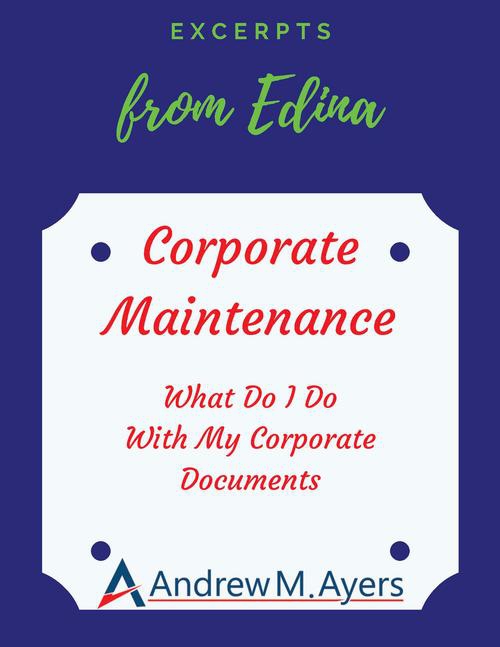.jpg) You've made it through the process of setting up your business (if you chose to formally incorporate it). Hopefully, you've finished all your required filings with your state, you've got your corporate agreements in place, and you've signed any resolutions or other documents that are needed to get the business up and running. At this point, most business owners are able to relax and get back to business. However, there can be some basic corporate maintenance that you need to take care of. Some of the documents are needed on an ongoing basis and it's important to have a system in place.
You've made it through the process of setting up your business (if you chose to formally incorporate it). Hopefully, you've finished all your required filings with your state, you've got your corporate agreements in place, and you've signed any resolutions or other documents that are needed to get the business up and running. At this point, most business owners are able to relax and get back to business. However, there can be some basic corporate maintenance that you need to take care of. Some of the documents are needed on an ongoing basis and it's important to have a system in place.
Having a system for corporate maintenance is where most of those websites offering to form your company for cheap fall short. Once they've given you the documents they mail-merged your information into, they are "done" with their role and it's left to you to figure out what to do next. It's yet another reason why it's smarter to work with a professional when setting up your business.
Your Corporate Binder
I'm a big fan of a 3-ring binder. When I'm working on a case in court, I have a separate binder for each case where I keep things organized and keep the important documents handy whenever we have a court appearance. Scattered around my office are binders for various sets of documents and other papers I need to keep handy. So, when I work with a business, when the documents are all prepared, we create a corporate binder as well to have a system for the storage of documents (an example of a corporate binder is pictured above). The company I work with also provides a corporate seal (which you can see in the small black pouch) and a set of dividers for the important types of information that you should be kept in the binder.
There are some common types of documents that you'll want to keep in your binder:
- Articles of Incorporation
- Professional Licensing Documents
- By-Laws for the Company
- Minutes of the Business from Meetings
- Corporate Agreements (Shareholders Agreement, Operating Agreement, etc.)
- Filings with Your State
- License Approvals and Permits
- Share Certificates
- Transfer Ledger for the shares of the business
The names and included documents may be different depending on what kind of business you are forming and what your local state requires.
In addition to the corporate binder, it is also helpful to use a client portal to allow for clients to have access to PDF versions of their documents as well. Many times you need quick access to one of the documents and you aren't near the hard copies, the PDF's are an easy way to access and share them with people who may need to see them (perhaps your new bank needs to see the formation documents before they will allow you to open an account).
Why Do I Need to Keep Corporate Records?
In many states, you are required to keep copies of your corporate records. These can become especially important if the business is sued and you are trying to shield yourself from personal liability. If all you have are some forms from a website that are a mess and unsigned, it may not appear to a judge that you are really running a business. On the other hand, if you've got nicely organized, complete corporate records, and are in compliance with the state laws, it proves that your business is operational and should be able to protect you personally (if appropriate in that case).
Down the road, if you go to sell your company, the buyer will want a chance to review your corporate records. When that happens, do you want to hand them some website forms with the URL and corporate branding for the website on it? It will likely convey a much better impression to the buyer if you are able to invite them in, or show up at a meeting, with a well organized corporate binder for them to review.
Do I Need to File My Corporate Records with the State?
This is going to depend on your state's requirements, but generally, corporate records do not need to be filed with the state. Your Articles of Incorporation are filed with the state to set up your business, but after that, your agreements, annual meeting minutes, shareholder certificates, and other documents just need to be maintained by your business.
You May Also Like
Next Steps
If you need help getting your corporate records in shape, let's set up a Legal Strategy Session to review the best path forward for you and your business.


